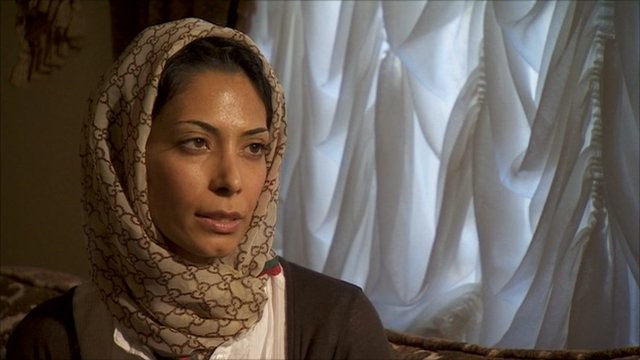Bahrain Uncovered pt 3: Intimidation Goes on, Says Doctor

The anniversary of the February 2011 protests in Bahrain has ratcheted up tensions to a palapable level across the Gulf island state.
A year after mass protests in the capital of Manama were met with mass arrests, accusations have been flying on both sides.
With the majority Shia population under the rule of a Sunni-based elite, the protests have often been analysed through a sectarian prism.
Activists insist, however, that while Shia, who form the bulk of the political opposition, are the main target of the security forces, no opposition political activist is safe.
During last year's crackdown the regime's forces arrested hundreds of Shia professionals ranging from doctors, nurses and teachers to opposition leaders, human rights activists and sportsmen.
Dr Fatima Haji, who was arrested and prosecuted for treating injured protesters, said it was clear that most of the intimidation tactics employed last year remain firmly in place.
She is part of a group of 20 doctors who were taken to court after being accused of participating in efforts to overthrow the monarchy. Charges included participating in an illegal gathering, acts of terrorism, stealing blood from hospital and harming the public by spreading false news.
She denied the charges but was sentenced to five years and has launched an appeal.
She was arrested in April when 20-30 masked men and a woman broke into her home in the early hours while she was alone with her two-year-old child. Her husband was at work, she says.
"They ransacked my apartment and took away some of my personal belongings," she continues. "They dragged me out of my apartment and I was forced to leave my child unattended. They did not tell me where I was going but I noticed that riot police jeeps were following us."
She was subsequently taken to security HQ, to a section usually used to interrogate drug dealers and smugglers, blindfolded and refused access to a lawyer or to her family.
"I was not even allowed a phone call," she says. "Then the verbal abuse started. They insulted and cursed me, they said my marriage was illegitimate and accused me of going to the protests to have sex. They threatened to rape me. That lasted for one hour."
It was just the start of her nightmare.
"I was once again blindfolded and handcuffed. They electrocuted me in the head and beat me, sometimes with a stick. They verbally harassed me, often threatened to rape me and tried to make me confess I had stolen blood and given it to protesters so they could pretend they were seriously injured. I was given little food and water, told to stand up and prohibited from going to the toilet. That lasted three days. "
Eleven months on and her life is still at a standstill. She has been released from prison pending the appeal but cannot return to work.
"We are doctors; we were just doing our regular job," she says. "We were treating injured and wounded people regardless of who they were - security forces, protesters, it did not matter.
"It did not only stop at us though. The regime launched a campaign against activists using Facebook and other social networks. At one point they broadcast pictures of activists they had taken [taken] from those sites on national TV, saying if you recognise this person, contact the authorities.
"Human rights violations have been massive in Bahrain. Cases of rape of men and women have been reported but not much is done."
A commission set up by the king to investigate allegations of human rights abuses made a series of recommendations but they have not been implemented, she adds.
"The security forces are still using teargas and shoot at our houses, even when there are no protests," she says. "Just days ago, they threw a teargas cannister in my car and I almost suffocated."
Since March, a number of people have died as a result of teargas inhalation and the Bahrain Centre for Human Rights has warned it also contributes to miscarriages in women.
"People are dying because of the exposure to teargas, lots of miscarriages. The forces gather kids, women in the streets and take them to the municipal buildings or houses and torture them, it is still going on every day. There are 14 ,15-year-olds dying from the teargas. The police also shoot the teargas cartridge at protesters' heads to kill them.
"The situation keeps deteriorating but contrary to countries like Tunisia or Egypt, it looks like the media has forgotten us. We just want political reforms, the implementations of the [commission] recommendation and for the regime to stop abusing the population."
© Copyright IBTimes 2025. All rights reserved.





















